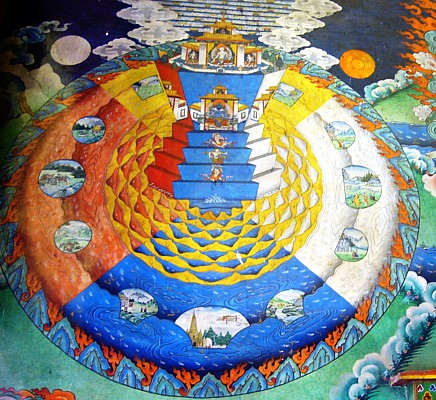Four continents: Difference between revisions
Jump to navigation
Jump to search
No edit summary |
|||
| Line 2: | Line 2: | ||
'''Four continents''' (Tib. གླིང་བཞི་, [[Wyl.]] ''gling bzhi'') — the four island-continents (Skt. ''dvīpa''; Tib. གླིང་, Wyl. ''gling'') which surround [[Mount Meru]] according to the cosmology of the [[Abhidharma]]. They are: | '''Four continents''' (Tib. གླིང་བཞི་, [[Wyl.]] ''gling bzhi'') — the four island-continents (Skt. ''dvīpa''; Tib. གླིང་, Wyl. ''gling'') which surround [[Mount Meru]] according to the cosmology of the [[Abhidharma]]. They are: | ||
#[[Purvavideha]] (Skt. ''Pūrvavideha''; Tib. ''Lüpakpo''; Wyl. ''lus 'phags po''; Eng. 'Surpassing the Body') in the East, which is semi-circular and white in colour; | #[[Purvavideha]] (Skt. ''Pūrvavideha''; Tib. ལུས་འཕགས་པོ་, ''Lüpakpo''; Wyl. ''lus 'phags po''; Eng. 'Surpassing the Body') in the East, which is semi-circular and white in colour; | ||
#[[Jambudvipa]] (Skt. ''Jambudvīpa''; Tib. ''Dzambuling''; Wyl. ''‘dzam bu gling''; Eng. 'Rose-Apple Continent') in the South, which is trapezoidal and blue (this is the continent we human beings live in); | #[[Jambudvipa]] (Skt. ''Jambudvīpa''; Tib. འཛམ་བུ་གླིང་, ''Dzambuling''; Wyl. ''‘dzam bu gling''; Eng. 'Rose-Apple Continent') in the South, which is trapezoidal and blue (this is the continent we human beings live in); | ||
#[[Aparagodaniya]] (Skt. ''Aparagodānīya;'' Tib. ''Balangchö''; Wyl. ''ba lang spyod''; Eng. 'Enjoyer of Cattle') in the West, which is circular and ruby red; and | #[[Aparagodaniya]] (Skt. ''Aparagodānīya;'' Tib. བ་ལང་སྤྱོད་, ''Balangchö''; Wyl. ''ba lang spyod''; Eng. 'Enjoyer of Cattle') in the West, which is circular and ruby red; and | ||
#[[Uttarakuru]] (Skt.; Tib. ''Draminyen''; Wyl. ''sgra mi snyan''; Eng. 'Unpleasant Sound') in the North, which is square and green. | #[[Uttarakuru]] (Skt.; Tib. སྒྲ་མི་སྙན་, ''Draminyen''; Wyl. ''sgra mi snyan''; Eng. 'Unpleasant Sound') in the North, which is square and green. | ||
Each of the four continents is flanked by two subcontinents (Skt. ''kṣudradvīpāni''; Wyl. ''gling phreng'') of the same shape (see [[eight subcontinents]]). | Each of the four continents is flanked by two subcontinents (Skt. ''kṣudradvīpāni''; Tib. གླིང་ཕྲེང་, ling treng; Wyl. ''gling phreng'') of the same shape (see [[eight subcontinents]]). | ||
Apart from the [[Chamara]] subcontinent of Jambudvipa, which is inhabited by [[rakshasa]] demons, all the other island-continents are inhabited by [[human beings]] of different characteristics, life styles and life-spans. Each continent also has a specific attribute (see [[four attributes of the four continents]]). | Apart from the [[Chamara]] subcontinent of Jambudvipa, which is inhabited by [[rakshasa]] demons, all the other island-continents are inhabited by [[human beings]] of different characteristics, life styles and life-spans. Each continent also has a specific attribute (see [[four attributes of the four continents]]). | ||
Revision as of 15:07, 3 January 2018

Four continents (Tib. གླིང་བཞི་, Wyl. gling bzhi) — the four island-continents (Skt. dvīpa; Tib. གླིང་, Wyl. gling) which surround Mount Meru according to the cosmology of the Abhidharma. They are:
- Purvavideha (Skt. Pūrvavideha; Tib. ལུས་འཕགས་པོ་, Lüpakpo; Wyl. lus 'phags po; Eng. 'Surpassing the Body') in the East, which is semi-circular and white in colour;
- Jambudvipa (Skt. Jambudvīpa; Tib. འཛམ་བུ་གླིང་, Dzambuling; Wyl. ‘dzam bu gling; Eng. 'Rose-Apple Continent') in the South, which is trapezoidal and blue (this is the continent we human beings live in);
- Aparagodaniya (Skt. Aparagodānīya; Tib. བ་ལང་སྤྱོད་, Balangchö; Wyl. ba lang spyod; Eng. 'Enjoyer of Cattle') in the West, which is circular and ruby red; and
- Uttarakuru (Skt.; Tib. སྒྲ་མི་སྙན་, Draminyen; Wyl. sgra mi snyan; Eng. 'Unpleasant Sound') in the North, which is square and green.
Each of the four continents is flanked by two subcontinents (Skt. kṣudradvīpāni; Tib. གླིང་ཕྲེང་, ling treng; Wyl. gling phreng) of the same shape (see eight subcontinents).
Apart from the Chamara subcontinent of Jambudvipa, which is inhabited by rakshasa demons, all the other island-continents are inhabited by human beings of different characteristics, life styles and life-spans. Each continent also has a specific attribute (see four attributes of the four continents).
Further Reading
- Jamgön Kongtrul, Myriad Worlds (Ithaca: Snow Lion, 1995), pages 110-113 & 138-140, ISBN 978-1559391887